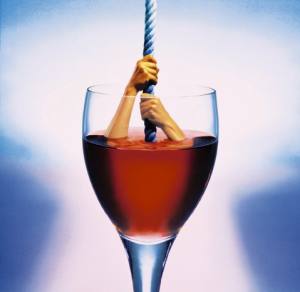Alcohol Addiction/Overindulgence
 Alcoholism
Alcoholism
Abstinence is the best course for those who can't control their drinking.
Although not a cure, various supplements may help heavy drinkers overcome their craving for alcohol, support them during the taxing withdrawal period and set them on the road to recovery.
What is it?
An intense physical and pschological dependence on alcohol is the hallmark of alcoholism – which many consider a chronic disease, like diabetes or hypertension.
Though alcohol in moderation appears to protect the heart, excessive drinking over time can damage the liver, pancreas, intestine, brain and other organs.
It can also cause malnutrition when empty alcohol kilojoules replace a nourishing diet.
What causes it?
Drinking has a social component: it makes most people feel talkative and relaxed.
Precisely why some people pursue alcohol to excess remains a mystery.
Psychosocial factors play a role, but there seems to be strong genetic component as well: indeed, children of alcoholics are at high risk of developing the disease, even when they are raised in nondrinking households.

What are the symptoms?
- Constantly seeking opportunities to drink; being unable to cut intake; putting alcohol before family, friends and work.
- Needing more and more alcohol to achieve the same effect.
- Reacting indignantly to criticism of drinking; adamantly denying the problem.
- Experiencing withdrawal signs (tremours, seizures and hallucinations) if drinking is stopped.
Are there any natural therapies?
Most heavy drinkers are deficient in important nutrients, including B vitamins, vitamin C and amino acids (protein), because they don't have a healthy diet and because alcohol has toxic effects. It many be beneficial to continue therapy for several months or more to help restore depleted nutrients.
Vitamin C can help to strengthen the body during this difficult period, clearing alcohol from the tissues ad ameliorating mild withdrawal symptoms; it is most useful when taken with vitamin E.
The B-complex vitamins, the amino acid glutamine and kudza vine extracts (from Chinese herbalists) appear to reduce the craving. Take extra thiamine as well to ease withdrawal symptoms.
The herb milk thistle and phosphatidylcholine (500 mg three times a day) strengthen the liver, helping it to rid the body of toxins.
The mineral chromium should be taken to prevent cravings caused by low blood sugar (hypoglycaemia), a common problem in alcoholics.
Evening primrose oil provides the fatty acid GLA (famma-linolenic acid); this substance stimulates production of a brain chemical called prostaglandin E, which works to prevent withdrawal symptoms such as seizures and depression.
It also helps to protect the liver and nervous system. The herbs kava and valerian are both natural sedatives.
What else can I do?
- Join a support group, such as Alcoholics Anonymous (AA).
- Try acupuncture: it may reduce the craving for alcohol.
Did you know?
The kudzu vine (Pueraria lobata) is sometimes called 'nature's Antabuse' after the well-known prescription addiction fighter (disulfiram). In Australia it's known as Japanese arrowroot and is found in tropical New South Wales.
Too Much Alcohol Can Cause Deadly Heart Disease
Consuming too much alcohol is bad for your heart and arteries, according to a recent study.
It’s well known that over-indulging in alcohol can give you a beer belly, however the results of this study show that drinking heavily can cause high blood pressure, stiff arteries and rigid heart muscles – all dangerous conditions that could lead to fatal heart attacks and strokes.

Alcohol Addiction – Not the Way to Cope With Grief, Trauma or Fear
Unfortunately, too many people are numbing their distress or sorrow by using alcohol. Alcoholism is a chronic, progressive disease that can have fatal consequences.
It is a condition marked by a dependance on alcohol.
This dependance can be physiological, psycological, social or genetic. However, effective treatments exist that can help families work toward recovery.
Being honest with yourself is the first step to recovery.
Alcohol Addiction – Not the Way to Cope With Grief, Trauma or Fear
Unfortunately, too many people are numbing their distress or sorrow by using alcohol. Alcoholism is a chronic, progressive disease that can have fatal consequences.
It is a condition marked by a dependance on alcohol.
This dependance can be physiological, psycological, social , or genetic. However, effective treatments exist that can help families work toward recovery.
Being honest with yourself is the first step to recovery.





